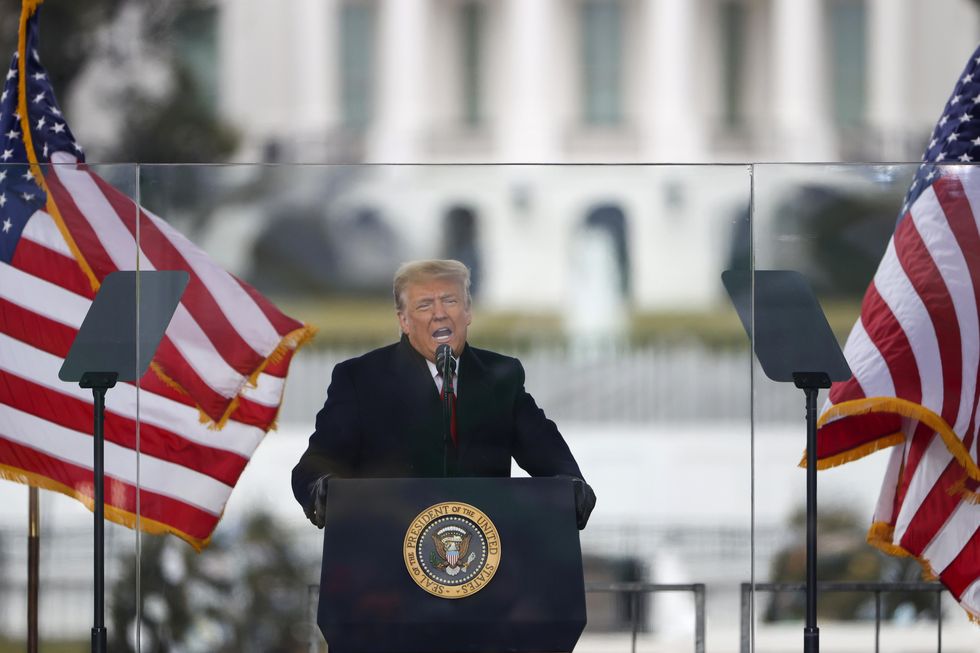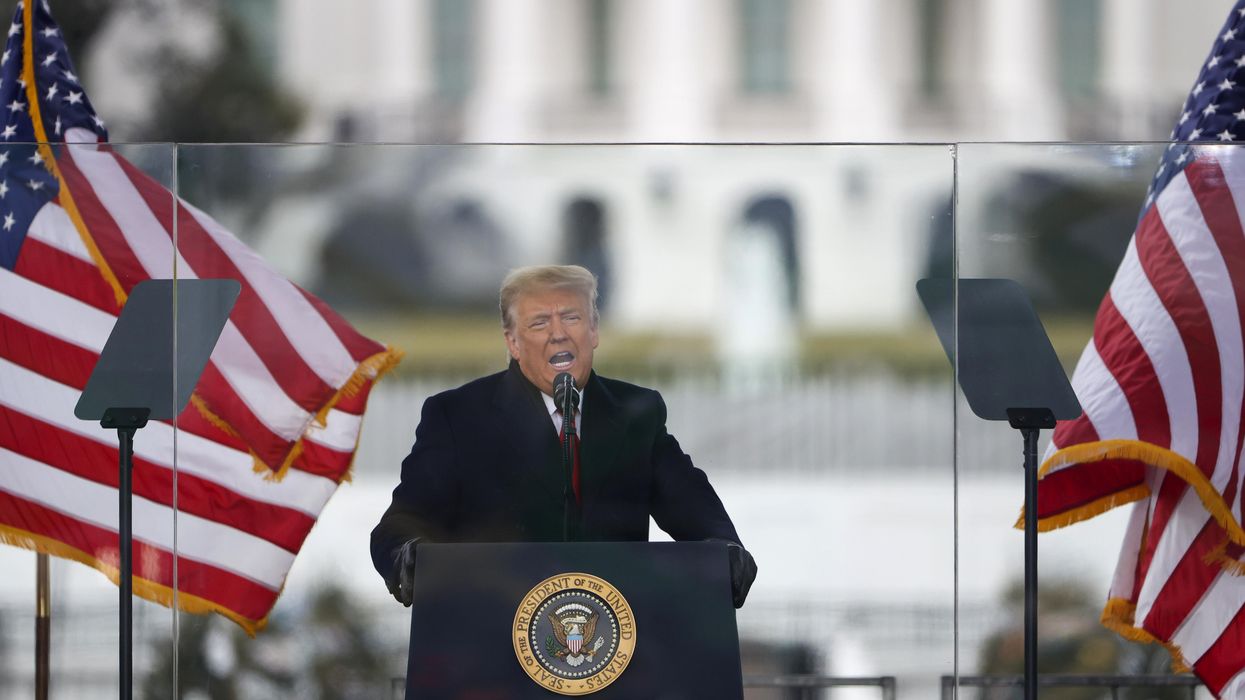Graber is the University System of Maryland Regents Professor of Law at the University of Maryland.
In 2024, former President Donald Trump will face some of his greatest challenges: criminal court cases, primary opponents and constitutional challenges to his eligibility to hold the office of president again. The Colorado Supreme Court has pushed that latter piece to the forefront, ruling on Dec. 19, 2023, that Trump cannot appear on Colorado’s 2024 presidential ballot because of his involvement in the Jan. 6, 2021, insurrection.
The reason is the 14th Amendment to the Constitution, ratified in 1868, three years after the Civil War ended. Section 3 of that amendment wrote into the Constitution the principle President Abraham Lincoln set out just three months after the first shots were fired in the Civil War. On July 4, 1861, he spoke to Congress, declaring that “ when ballots have fairly, and constitutionally, decided, there can be no successful appeal back to bullets.”
The text of Section 3 of the 14th Amendment states, in full:
“No person shall be a Senator or Representative in Congress, or elector of President and Vice-President, or hold any office, civil or military, under the United States, or under any State, who, having previously taken an oath, as a member of Congress, or as an officer of the United States, or as a member of any State legislature, or as an executive or judicial officer of any State, to support the Constitution of the United States, shall have engaged in insurrection or rebellion against the same, or given aid or comfort to the enemies thereof. But Congress may by a vote of two-thirds of each House, remove such disability.”
To me as a scholar of constitutional law, each sentence and sentence fragment captures the commitment made by the nation in the wake of the Civil War to govern by constitutional politics. People seeking political and constitutional changes must play by the rules set out in the Constitution. In a democracy, people cannot substitute force, violence or intimidation for persuasion, coalition building and voting.
The power of the ballot
The first words of Section 3 describe various offices that people can only hold if they satisfy the constitutional rules for election or appointment. The Republicans who wrote the amendment repeatedly declared that Section 3 covered all offices established by the Constitution. That included the presidency, a point many participants in framing, ratifying and implementation debates over constitutional disqualification made explicitly, as documented in the records of debate in the 39th Congress, which wrote and passed the amendment.
Senators, representatives and presidential electors are spelled out because some doubt existed when the amendment was debated in 1866 as to whether they were officers of the United States, although they were frequently referred to as such in the course of congressional debates.
No one can hold any of the offices enumerated in Section 3 without the power of the ballot. They can only hold office if they are voted into it – or nominated and confirmed by people who have been voted into office. No office mentioned in the first clause of Section 3 may be achieved by force, violence or intimidation.
A required oath
The next words in Section 3 describe the oath “to support [the] Constitution” that Article 6 of the Constitution requires all office holders in the United States to take.
The people who wrote Section 3 insisted during congressional debates that anyone who took an oath of office, including the president, were subject to Section 3’s rules. The presidential oath’s wording is slightly different from that of other federal officers, but everyone in the federal government swears to uphold the Constitution before being allowed to take office.
These oaths bind officeholders to follow all the rules in the Constitution. The only legitimate government officers are those who hold their offices under the constitutional rules. Lawmakers must follow the Constitution’s rules for making laws. Officeholders can only recognize laws that were made by following the rules – and they must recognize all such laws as legitimate.
This provision of the amendment ensures that their oaths of office obligate officials to govern by voting rather than violence.
Defining disqualification
Section 3 then says people can be disqualified from holding office if they “engaged in insurrection or rebellion.” Legal authorities from the American Revolution to the post-Civil War Reconstruction understood an insurrection to have occurred when two or more people resisted a federal law by force or violence for a public, or civic, purpose.
Shay’s Rebellion, the Whiskey Insurrection, Burr’s Rebellion, John Brown’s Raid and other events were insurrections, even when the goal was not overturning the government.
What these events had in common was that people were trying to prevent the enforcement of laws that were consequences of persuasion, coalition building and voting. Or they were trying to create new laws by force, violence and intimidation.
These words in the amendment declare that those who turn to bullets when ballots fail to provide their desired result cannot be trusted as democratic officials. When applied specifically to the events on Jan. 6, 2021, the amendment declares that those who turn to violence when voting goes against them cannot hold office in a democratic nation.
A chance at clemency
The last sentence of Section 3 announces that forgiveness is possible. It says “Congress may by a vote of two-thirds of each House, remove such disability” – the ineligibility of individuals or categories of people to hold office because of having participated in an insurrection or rebellion.
For instance, Congress might remove the restriction on office-holding based on evidence that the insurrectionist was genuinely contrite. It did so for repentant former Confederate General James Longstreet .
Or Congress might conclude in retrospect that violence was appropriate, such as against particularly unjust laws. Given their powerful anti-slavery commitments and abolitionist roots, I believe that Republicans in the House and Senate in the late 1850s would almost certainly have allowed people who violently resisted the fugitive slave laws to hold office again. This provision of the amendment says that bullets may substitute for ballots and violence for voting only in very unusual circumstances.
A clear conclusion
Taken as a whole, the structure of Section 3 leads to the conclusion that Donald Trump is one of those past or present government officials who by violating his oath of allegiance to the constitutional rules has forfeited his right to present and future office.
Trump’s supporters say the president is neither an “officer under the United States” nor an “officer of the United States” as specified in Section 3. Therefore, they say, he is exempt from its provisions.
But in fact, both common sense and history demonstrate that Trump was an officer, an officer of the United States and an officer under the United States for constitutional purposes. Most people, even lawyers and constitutional scholars like me, do not distinguish between those specific phrases in ordinary discourse. The people who framed and ratified Section 3 saw no distinction. Exhaustive research by Trump supporters has yet to produce a single assertion to the contrary that was made in the immediate aftermath of the Civil War. Yet scholars John Vlahoplus and Gerard Magliocca are daily producing newspaper and other reports asserting that presidents are covered by Section 3.
Significant numbers of Republicans and Democrats in the House and Senate agreed that Donald Trump violated his oath of office immediately before, during and immediately after the events of Jan. 6, 2021. Most Republican senators who voted against his conviction did so on the grounds that they did not have the power to convict a president who was no longer in office. Most of them did not dispute that Trump participated in an insurrection. A judge in Colorado also found that Trump “ engaged in insurrection,” which was the basis for the state’s Supreme Court ruling barring him from the ballot.
Constitutional democracy is rule by law. Those who have demonstrated their rejection of rule by law may not apply, no matter their popularity. Jefferson Davis participated in an insurrection against the United States in 1861. He was not eligible to become president of the U.S. four years later, or to hold any other state or federal office ever again. If Davis was barred from office, then the conclusion must be that Trump is too – as a man who participated in an insurrection against the United States in 2021.![]()
This article is republished from The Conversation under a Creative Commons license. Read the original article.
President Trump spoke to tens of thousands of his supporters near the White House on Wednesday.
 President Trump spoke to tens of thousands of his supporters near the White House on Wednesday.Tasos Katopodis/Getty Images
President Trump spoke to tens of thousands of his supporters near the White House on Wednesday.Tasos Katopodis/Getty Images


















